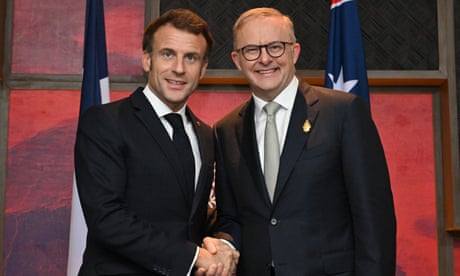- by foxnews
- 08 Apr 2025
Anthony Albanese seeks ways to boost Australia’s defence capability as G20 ends
Anthony Albanese seeks ways to boost Australia’s defence capability as G20 ends
- by theguardian
- 17 Nov 2022
- in news

Anthony Albanese has confirmed he canvassed interim solutions to boost Australia's defence capability with Joe Biden, Rishi Sunak and Emmanuel Macron in a flurry of private meetings on the sidelines of the G20 and East Asia summits.
After meeting the French president in Bali on Wednesday, Australia's prime minister flagged he was actively pursuing closer defence and security cooperation with Macron, given France is a significant Pacific and Indian ocean power.
Albanese declined to go into the specifics of equipment being discussed, but confirmed he has invited Macron to visit Australia to deepen linkages on defence, and also to coordinate action to deal with the climate crisis.
The government has engaged the former chief of the Australian defence force Sir Angus Houston and former Labor defence minister Stephen Smith to work on a defence strategic review that will spell out the capability needed by Australia to respond to security threats in the Indo-Pacific as China pursues its military buildup and becomes more active in the region.
As well as that review, Vice Admiral Jonathan Mead is the head of a taskforce that is working with counterparts in the US and the UK to advise the government on how to deliver the Aukus project.
A key part of that work will be determining how long before Australia's new fleet of nuclear submarines can be operational - and whether there is a "capability gap" that needs to be filled in the meantime. It has been widely assumed that the first submarines may not be operational until the late 2030s.
Albanese told reporters in Bali on Wednesday night the strategic review was considering not only where Australia placed its defence assets but also "what those appropriate assets are".
Referencing his summit season catch-ups with the two Aukus partners, the US and Britain, and with France - the key ally the former government spurned by cancelling a lucrative submarine contract with a French manufacturer to pursue the agreement to produce nuclear powered submarines - Albanese said "we did have some discussions" about the capability gap.
"Obviously some of those matters and some of those things I won't go into publicly, but they'll be the subject of the defence strategic review that you will see before March next year," the prime minister said.
As well as engaging key peers on defence, Albanese used the opportunity of the G20 to lobby European leaders to fast-track a free trade agreement between Australia and the European Union.
He spoke to the leaders of Germany, Italy and Spain as well as Macron and representatives from the EU. Albanese was originally hoping to have a bilateral meeting with the German chancellor Olaf Scholz but instead had a lengthy conversation in between summit sessions about trade and about the energy crisis in Europe.
Albanese noted Germany had been badly impacted by the global energy shock caused by Russia's illegal invasion of Ukraine "and the issue of secure energy supplies".
He said he engaged the chancellor about soaring gas prices and the impact of that on inflation "and the challenge of dealing with that" in both Germany and Australia.
Labor flagged a regulatory intervention in Australia to bring down gas and power prices after Treasury released a new forecast that prices would rise by 56% by the end of next year.
Albanese said his talks with European officials suggested the remaining obstacles to landing an EU free trade deal could be dealt with. Given any agreement would need to be ratified by EU countries, Albanese said he made a point of lobbying leaders individually.
"There's a link of course between economic relationships and free trade and national security, and democratic nations need to engage with each other," the prime minister said. "We need free and open markets that support trade and prosperity, and that is the basis of my discussions".
The president of the European Commission Ursula von der Leyen told Albanese during a conversation on Wednesday: "I'm very much looking to working in-depth on the free trade agreement. Both sides want it and both sides want to conclude it".
Albanese also pursued the Indian prime minister, Narendra Modi, about economic opportunities during a meeting on the sidelines of the summit, and he has invited Modi to address the Australian parliament when he visits Australia next year for a meeting of the Quad.
The G20 summit wound up on Wednesday. The war in Ukraine cast a long shadow over the event, and sparked an internal tussle over the wording of the final communique. Most G20 members wanted strong language condemning the conflict recorded in the statement, but Russia and China objected.
The final wording noted that "most" G20 members strongly condemned the war in Ukraine and stressed the conflict was causing "immense human suffering and exacerbating existing fragilities in the global economy - constraining growth, increasing inflation, disrupting supply chains, heightening energy and food security, and elevating financial stability risks". The statement also noted "there were other views and different assessments of the situation and sanctions".
The gathering of world leaders has intensified political pressure on Russia to end the war. The summit host, Indonesian president Joko Widodo, ended the G20 by making a strong plea to Russia to de-escalate.
Australia has also used this week's diplomatic thaw to urge China to use its influence with Vladimir Putin to persuade Russia to step back from the brink.
- by foxnews
- descember 09, 2016
Ancient settlement reveals remains of 1,800-year-old dog, baffling experts: 'Preserved quite well'
Archaeologists have recently unearthed the remarkably well-preserved remains of a dog from ancient Rome, shedding light on the widespread practice of ritual sacrifice in antiquity.
read more


